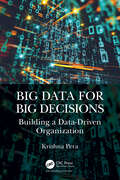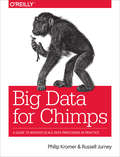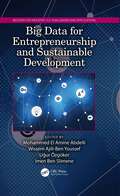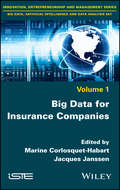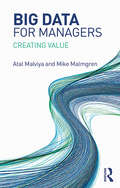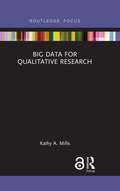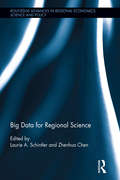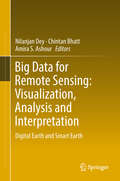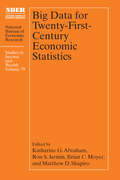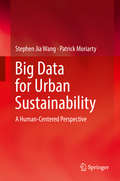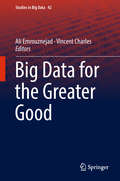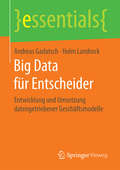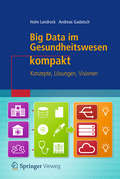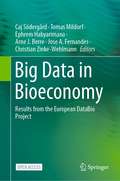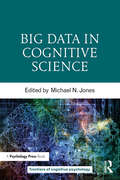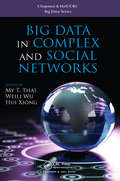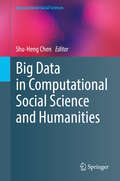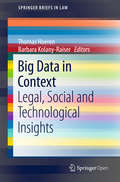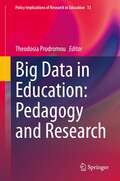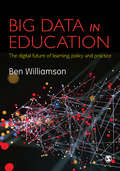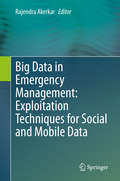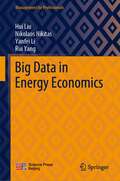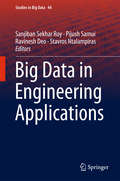- Table View
- List View
Big Data for Big Decisions: Building a Data-Driven Organization
by Krishna PeraBuilding a data-driven organization (DDO) is an enterprise-wide initiative that may consume and lock up resources for the long term. Understandably, any organization considering such an initiative would insist on a roadmap and business case to be prepared and evaluated prior to approval. This book presents a step-by-step methodology in order to create a roadmap and business case, and provides a narration of the constraints and experiences of managers who have attempted the setting up of DDOs. The emphasis is on the big decisions – the key decisions that influence 90% of business outcomes – starting from decision first and reengineering the data to the decisions process-chain and data governance, so as to ensure the right data are available at the right time, every time. Investing in artificial intelligence and data-driven decision making are now being considered a survival necessity for organizations to stay competitive. While every enterprise aspires to become 100% data-driven and every Chief Information Officer (CIO) has a budget, Gartner estimates over 80% of all analytics projects fail to deliver intended value. Most CIOs think a data-driven organization is a distant dream, especially while they are still struggling to explain the value from analytics. They know a few isolated successes, or a one-time leveraging of big data for decision making does not make an organization data-driven. As of now, there is no precise definition for data-driven organization or what qualifies an organization to call itself data-driven. Given the hype in the market for big data, analytics and AI, every CIO has a budget for analytics, but very little clarity on where to begin or how to choose and prioritize the analytics projects. Most end up investing in a visualization platform like Tableau or QlikView, which in essence is an improved version of their BI dashboard that the organization had invested into not too long ago. The most important stakeholders, the decision-makers, are rarely kept in the loop while choosing analytics projects. This book provides a fail-safe methodology for assured success in deriving intended value from investments into analytics. It is a practitioners’ handbook for creating a step-by-step transformational roadmap prioritizing the big data for the big decisions, the 10% of decisions that influence 90% of business outcomes, and delivering material improvements in the quality of decisions, as well as measurable value from analytics investments. The acid test for a data-driven organization is when all the big decisions, especially top-level strategic decisions, are taken based on data and not on the collective gut feeling of the decision makers in the organization.
Big Data for Chimps: A Guide to Massive-Scale Data Processing in Practice
by Russell Jurney Philip Flip KromerFinding patterns in massive event streams can be difficult, but learning how to find them doesn’t have to be. This unique hands-on guide shows you how to solve this and many other problems in large-scale data processing with simple, fun, and elegant tools that leverage Apache Hadoop. You’ll gain a practical, actionable view of big data by working with real data and real problems.Perfect for beginners, this book’s approach will also appeal to experienced practitioners who want to brush up on their skills. Part I explains how Hadoop and MapReduce work, while Part II covers many analytic patterns you can use to process any data. As you work through several exercises, you’ll also learn how to use Apache Pig to process data.Learn the necessary mechanics of working with Hadoop, including how data and computation move around the clusterDive into map/reduce mechanics and build your first map/reduce job in PythonUnderstand how to run chains of map/reduce jobs in the form of Pig scriptsUse a real-world dataset—baseball performance statistics—throughout the bookWork with examples of several analytic patterns, and learn when and where you might use them
Big Data for Entrepreneurship and Sustainable Development (Big Data for Industry 4.0)
by Imen Ben Slimene Uğur Özgöker Amine Abdelli, Mohammed El Youssef, Wissem Ajili-BenThis book provides insight for researchers and decision-makers on the application of data in the entrepreneurship and sustainable development sector. This book covers how Big Data for Industry 4.0 and entrepreneurship are effective in resolving business, social, and economic problems.The book discusses how entrepreneurs use Big Data to cut costs and minimize the waste of time. It offers how using Big Data can increase efficiency, enables the studying of competitors, can improve the pricing of products, increase sales and loyalty, and can ensure the right people are hired. The book presents how decision-makers can make use of Big Data to resolve economic and social problems. Analyze the development of the economy and enhance the business climate.This book is for researchers, PhD students, and entrepreneurs and can also be of interest for transforming governments as well as businesses.
Big Data for Insurance Companies
by Jacques Janssen Marine Corlosquet-HabartThis book will be a “must” for people who want good knowledge of big data concepts and their applications in the real world, particularly in the field of insurance. It will be useful to people working in finance and to masters students using big data tools. The authors present the bases of big data: data analysis methods, learning processes, application to insurance and position within the insurance market. Individual chapters a will be written by well-known authors in this field.
Big Data for Managers: Creating Value
by Atal Malviya Mike MalmgrenIn today’s fast growing digital world, the web, mobile, social networks and other digital platforms are producing enormous amounts of data that hold intelligence and valuable information. Correctly used it has the power to create sustainable value in different forms for businesses. The commonly used term for this data is Big Data, which includes structured, unstructured and hybrid structured data. However, Big Data is of limited value unless insightful information can be extracted from the sources of data. The solution is Big Data analytics, and how managers and executives can capture value from this vast resource of information and insights. This book develops a simple framework and a non-technical approach to help the reader understand, digest and analyze data, and produce meaningful analytics to make informed decisions. It will support value creation within businesses, from customer care to product innovation, from sales and marketing to operational performance. The authors provide multiple case studies on global industries and business units, chapter summaries and discussion questions for the reader to consider and explore. Big Data for Managers also presents small cases and challenges for the reader to work on – making this a thorough and practical guide for students and managers.
Big Data for Qualitative Research
by Kathy A. MillsBig Data for Qualitative Research covers everything small data researchers need to know about big data, from the potentials of big data analytics to its methodological and ethical challenges. The data that we generate in everyday life is now digitally mediated, stored, and analyzed by web sites, companies, institutions, and governments. Big data is large volume, rapidly generated, digitally encoded information that is often related to other networked data, and can provide valuable evidence for study of phenomena. This book explores the potentials of qualitative methods and analysis for big data, including text mining, sentiment analysis, information and data visualization, netnography, follow-the-thing methods, mobile research methods, multimodal analysis, and rhythmanalysis. It debates new concerns about ethics, privacy, and dataveillance for big data qualitative researchers. This book is essential reading for those who do qualitative and mixed methods research, and are curious, excited, or even skeptical about big data and what it means for future research. Now is the time for researchers to understand, debate, and envisage the new possibilities and challenges of the rapidly developing and dynamic field of big data from the vantage point of the qualitative researcher.
Big Data for Regional Science (Routledge Advances in Regional Economics, Science and Policy)
by Zhenhua Chen Laurie A SchintlerRecent technological advancements and other related factors and trends are contributing to the production of an astoundingly large and rapidly accelerating collection of data, or ‘Big Data’. This data now allows us to examine urban and regional phenomena in ways that were previously not possible. Despite the tremendous potential of big data for regional science, its use and application in this context is fraught with issues and challenges. This book brings together leading contributors to present an interdisciplinary, agenda-setting and action-oriented platform for research and practice in the urban and regional community. This book provides a comprehensive, multidisciplinary and cutting-edge perspective on big data for regional science. Chapters contain a collection of research notes contributed by experts from all over the world with a wide array of disciplinary backgrounds. The content is organized along four themes: sources of big data; integration, processing and management of big data; analytics for big data; and, higher level policy and programmatic considerations. As well as concisely and comprehensively synthesising work done to date, the book also considers future challenges and prospects for the use of big data in regional science. Big Data for Regional Science provides a seminal contribution to the field of regional science and will appeal to a broad audience, including those at all levels of academia, industry, and government.
Big Data for Remote Sensing: Digital Earth And Smart Earth
by Nilanjan Dey Chintan Bhatt Amira S. AshourThis book thoroughly covers the remote sensing visualization and analysis techniques based on computational imaging and vision in Earth science. Remote sensing is considered a significant information source for monitoring and mapping natural and man-made land through the development of sensor resolutions that committed different Earth observation platforms. The book includes related topics for the different systems, models, and approaches used in the visualization of remote sensing images. It offers flexible and sophisticated solutions for removing uncertainty from the satellite data. It introduces real time big data analytics to derive intelligence systems in enterprise earth science applications. Furthermore, the book integrates statistical concepts with computer-based geographic information systems (GIS). It focuses on image processing techniques for observing data together with uncertainty information raised by spectral, spatial, and positional accuracy of GPS data. The book addresses several advanced improvement models to guide the engineers in developing different remote sensing visualization and analysis schemes. Highlights on the advanced improvement models of the supervised/unsupervised classification algorithms, support vector machines, artificial neural networks, fuzzy logic, decision-making algorithms, and Time Series Model and Forecasting are addressed. This book guides engineers, designers, and researchers to exploit the intrinsic design remote sensing systems. The book gathers remarkable material from an international experts' panel to guide the readers during the development of earth big data analytics and their challenges.
Big Data for Twenty-First-Century Economic Statistics (National Bureau of Economic Research Studies in Income and Wealth #79)
by Katharine G. Abraham, Ron S. Jarmin, Brian C. Moyer, and Matthew D. ShapiroThe papers in this volume analyze the deployment of Big Data to solve both existing and novel challenges in economic measurement. The existing infrastructure for the production of key economic statistics relies heavily on data collected through sample surveys and periodic censuses, together with administrative records generated in connection with tax administration. The increasing difficulty of obtaining survey and census responses threatens the viability of existing data collection approaches. The growing availability of new sources of Big Data—such as scanner data on purchases, credit card transaction records, payroll information, and prices of various goods scraped from the websites of online sellers—has changed the data landscape. These new sources of data hold the promise of allowing the statistical agencies to produce more accurate, more disaggregated, and more timely economic data to meet the needs of policymakers and other data users. This volume documents progress made toward that goal and the challenges to be overcome to realize the full potential of Big Data in the production of economic statistics. It describes the deployment of Big Data to solve both existing and novel challenges in economic measurement, and it will be of interest to statistical agency staff, academic researchers, and serious users of economic statistics.
Big Data for Twenty-First-Century Economic Statistics (National Bureau of Economic Research Studies in Income and Wealth #79)
by Katharine G. Abraham, Ron S. Jarmin, Brian C. Moyer, and Matthew D. ShapiroThe papers in this volume analyze the deployment of Big Data to solve both existing and novel challenges in economic measurement. The existing infrastructure for the production of key economic statistics relies heavily on data collected through sample surveys and periodic censuses, together with administrative records generated in connection with tax administration. The increasing difficulty of obtaining survey and census responses threatens the viability of existing data collection approaches. The growing availability of new sources of Big Data—such as scanner data on purchases, credit card transaction records, payroll information, and prices of various goods scraped from the websites of online sellers—has changed the data landscape. These new sources of data hold the promise of allowing the statistical agencies to produce more accurate, more disaggregated, and more timely economic data to meet the needs of policymakers and other data users. This volume documents progress made toward that goal and the challenges to be overcome to realize the full potential of Big Data in the production of economic statistics. It describes the deployment of Big Data to solve both existing and novel challenges in economic measurement, and it will be of interest to statistical agency staff, academic researchers, and serious users of economic statistics.
Big Data for Urban Sustainability
by Stephen Jia Wang Patrick MoriartyThis book presents a practical framework for the application of big data, cloud, and pervasive and complex systems to sustainable solutions for urban environmental challenges. It covers the technologies, potential, and possible and impact of big data on energy efficiency and the urban environment.The book first introduces key aspects of big data, cloud services, pervasive computing, and mobile technologies from a pragmatic design perspective, including sample open source firmware. Cloud services, mobile and embedded platforms, interfaces, operating system design methods, networking, and middleware are all considered. The authors then explore in detail the framework, design principles, architecture and key components of developing energy systems to support sustainable urban environments. The included case study provides a pathway to improve the eco-efficiency of urban transport, demonstrating how to design an energy efficient next generation urban navigation system by leveraging vast cloud data sets on user-behavior. Ultimately, this resource maps big data’s pivotal intersection with rapid global urbanization along the path to a sustainable future.
Big Data for the Greater Good (Studies in Big Data #42)
by Ali Emrouznejad Vincent CharlesThis book highlights some of the most fascinating current uses, thought-provoking changes, and biggest challenges that Big Data means for our society. The explosive growth of data and advances in Big Data analytics have created a new frontier for innovation, competition, productivity, and well-being in almost every sector of our society, as well as a source of immense economic and societal value. From the derivation of customer feedback-based insights to fraud detection and preserving privacy; better medical treatments; agriculture and food management; and establishing low-voltage networks – many innovations for the greater good can stem from Big Data. Given the insights it provides, this book will be of interest to both researchers in the field of Big Data, and practitioners from various fields who intend to apply Big Data technologies to improve their strategic and operational decision-making processes.
Big Data für Entscheider: Entwicklung und Umsetzung datengetriebener Geschäftsmodelle (essentials)
by Andreas Gadatsch Holm LandrockAndreas Gadatsch und Holm Landrock zeigen an typischen Beispielen aus der Praxis, wie datengetriebene Geschäftsmodelle entstehen. Sie erläutern, wie sich Big-Data-Projekte rechnen und wie man am einfachsten an die Analyse großer Datenmengen herangeht. Eine Bewertung der zentralen Aspekte von Projekten und der dort eingesetzten Technologien erleichtert den Lesern die tägliche Praxis im IT-Management. Die Autoren stellen Hadoop als eine der wichtigen Big-Data-Technologien vor.
Big Data im Gesundheitswesen kompakt: Konzepte, Lösungen, Visionen (It Kompakt Ser.)
by Andreas Gadatsch Holm LandrockDas kompakte Fachbuch gibt einen Überblick über die Möglichkeiten von „Big Data“ im Gesundheitswesen und beschreibt anhand von ausgewählten Szenarien mögliche Einsatzgebiete.Die Autoren erläutern zentrale Systemkomponenten und IT-Standards und thematisieren anhand wichtiger Daten des Gesundheitswesens die Notwendigkeit der Strukturierung und Modellierung von Daten. Das Buch gibt Hinweise wie Geschäftsprozesse im Gesundheitswesen dokumentiert, analysiert und verbessert werden können. Anwendungsszenarien, wie die Datenanalysen für Krankenhäuser, Labore, Versicherungen und die Pharmaindustrie, zeigen die praktische Relevanz des Themas. Aber auch rechtliche und ethische Aspekte werden inhaltlich angeschnitten.Ein Buch für Entscheider in der medizinischen Leitung und Verwaltung von Krankenhäusern, Fachleute sowie niedergelassene Ärzte und Apotheker, aber auch Personen in Ausbildung und Studium im Gesundheitswesen.
Big Data in Bioeconomy: Results from the European DataBio Project
by Christian Zinke-Wehlmann Caj Södergård Tomas Mildorf Ephrem Habyarimana Arne J. Berre Jose A. FernandesThis edited open access book presents the comprehensive outcome of The European DataBio Project, which examined new data-driven methods to shape a bioeconomy. These methods are used to develop new and sustainable ways to use forest, farm and fishery resources. As a European initiative, the goal is to use these new findings to support decision-makers and producers – meaning farmers, land and forest owners and fishermen.With their 27 pilot projects from 17 countries, the authors examine important sectors and highlight examples where modern data-driven methods were used to increase sustainability. How can farmers, foresters or fishermen use these insights in their daily lives? The authors answer this and other questions for our readers. The first four parts of this book give an overview of the big data technologies relevant for optimal raw material gathering. The next three parts put these technologies into perspective, by showing useable applications from farming, forestry and fishery. The final part of this book gives a summary and a view on the future.With its broad outlook and variety of topics, this book is an enrichment for students and scientists in bioeconomy, biodiversity and renewable resources.
Big Data in Cognitive Science (Frontiers of Cognitive Psychology)
by Michael N. JonesWhile laboratory research is the backbone of collecting experimental data in cognitive science, a rapidly increasing amount of research is now capitalizing on large-scale and real-world digital data. Each piece of data is a trace of human behavior and offers us a potential clue to understanding basic cognitive principles. However, we have to be able to put the pieces together in a reasonable way, which necessitates both advances in our theoretical models and development of new methodological techniques. The primary goal of this volume is to present cutting-edge examples of mining large-scale and naturalistic data to discover important principles of cognition and evaluate theories that would not be possible without such a scale. This book also has a mission to stimulate cognitive scientists to consider new ways to harness big data in order to enhance our understanding of fundamental cognitive processes. Finally, this book aims to warn of the potential pitfalls of using, or being over-reliant on, big data and to show how big data can work alongside traditional, rigorously gathered experimental data rather than simply supersede it. In sum, this groundbreaking volume presents cognitive scientists and those in related fields with an exciting, detailed, stimulating, and realistic introduction to big data – and to show how it may greatly advance our understanding of the principles of human memory, perception, categorization, decision-making, language, problem-solving, and representation.
Big Data in Complex and Social Networks (Chapman & Hall/CRC Big Data Series)
by My T. Thai, Weili Wu, Hui XiongThis book presents recent developments on the theoretical, algorithmic, and application aspects of Big Data in Complex and Social Networks. The book consists of four parts, covering a wide range of topics. The first part of the book focuses on data storage and data processing. It explores how the efficient storage of data can fundamentally support intensive data access and queries, which enables sophisticated analysis. It also looks at how data processing and visualization help to communicate information clearly and efficiently. The second part of the book is devoted to the extraction of essential information and the prediction of web content. The book shows how Big Data analysis can be used to understand the interests, location, and search history of users and provide more accurate predictions of User Behavior. The latter two parts of the book cover the protection of privacy and security, and emergent applications of big data and social networks. It analyzes how to model rumor diffusion, identify misinformation from massive data, and design intervention strategies. Applications of big data and social networks in multilayer networks and multiparty systems are also covered in-depth.
Big Data in Computational Social Science and Humanities (Computational Social Sciences)
by Shu-Heng ChenThis edited volume focuses on big data implications for computational social science and humanities from management to usage. The first part of the book covers geographic data, text corpus data, and social media data, and exemplifies their concrete applications in a wide range of fields including anthropology, economics, finance, geography, history, linguistics, political science, psychology, public health, and mass communications. The second part of the book provides a panoramic view of the development of big data in the fields of computational social sciences and humanities. The following questions are addressed: why is there a need for novel data governance for this new type of data?, why is big data important for social scientists?, and how will it revolutionize the way social scientists conduct research? With the advent of the information age and technologies such as Web 2.0, ubiquitous computing, wearable devices, and the Internet of Things, digital society has fundamentally changed what we now know as "data", the very use of this data, and what we now call "knowledge". Big data has become the standard in social sciences, and has made these sciences more computational. Big Data in Computational Social Science and Humanities will appeal to graduate students and researchers working in the many subfields of the social sciences and humanities.
Big Data in Context: Legal, Social and Technological Insights (SpringerBriefs in Law)
by Thomas Hoeren Barbara Kolany-RaiserThis book is open access under a CC BY 4. 0 license. This book sheds new light on a selection of big data scenarios from an interdisciplinary perspective. It features legal, sociological and economic approaches to fundamental big data topics such as privacy, data quality and the ECJ's Safe Harbor decision on the one hand, and practical applications such as smart cars, wearables and web tracking on the other. Addressing the interests of researchers and practitioners alike, it provides a comprehensive overview of and introduction to the emerging challenges regarding big data. All contributions are based on papers submitted in connection with ABIDA (Assessing Big Data), an interdisciplinary research project exploring the societal aspects of big data and funded by the German Federal Ministry of Education and Research. This volume was produced as a part of the ABIDA project (Assessing Big Data, 01IS15016A-F). ABIDA is a four-year collaborative project funded by the Federal Ministry of Education and Research. However the views and opinions expressed in this book reflect only the authors' point of view and not necessarily those of all members of the ABIDA project or the Federal Ministry of Education and Research.
Big Data in Education: Pedagogy and Research (Policy Implications of Research in Education #13)
by Theodosia ProdromouThis book discusses how Big Data could be implemented in educational settings and research, using empirical data and suggesting both best practices and areas in which to invest future research and development. It also explores: 1) the use of learning analytics to improve learning and teaching; 2) the opportunities and challenges of learning analytics in education. As Big Data becomes a common part of the fabric of our world, education and research are challenged to use this data to improve educational and research systems, and also are tasked with teaching coming generations to deal with Big Data both effectively and ethically. The Big Data era is changing the data landscape for statistical analysis, the ways in which data is captured and presented, and the necessary level of statistical literacy to analyse and interpret data for future decision making. The advent of Big Data accentuates the need to enable citizens to develop statistical skills, thinking and reasoning needed for representing, integrating and exploring complex information.This book offers guidance to researchers who are seeking suitable topics to explore. It presents research into the skills needed by data practitioners (data analysts, data managers, statisticians, and data consumers, academics), and provides insights into the statistical skills, thinking and reasoning needed by educators and researchers in the future to work with Big Data. This book serves as a concise reference for policymakers, who must make critical decisions regarding funding and applications.
Big Data in Education: The digital future of learning, policy and practice
by Ben WilliamsonBig data has the power to transform education and educational research. Governments, researchers and commercial companies are only beginning to understand the potential that big data offers in informing policy ideas, contributing to the development of new educational tools and innovative ways of conducting research. This cutting-edge overview explores the current state-of-play, looking at big data and the related topic of computer code to examine the implications for education and schooling for today and the near future. Key topics include: · The role of learning analytics and educational data science in schools · A critical appreciation of code, algorithms and infrastructures · The rise of ‘cognitive classrooms’, and the practical application of computational algorithms to learning environments · Important digital research methods issues for researchers This is essential reading for anyone studying or working in today's education environment!
Big Data in Education: The digital future of learning, policy and practice
by Ben WilliamsonBig data has the power to transform education and educational research. Governments, researchers and commercial companies are only beginning to understand the potential that big data offers in informing policy ideas, contributing to the development of new educational tools and innovative ways of conducting research. This cutting-edge overview explores the current state-of-play, looking at big data and the related topic of computer code to examine the implications for education and schooling for today and the near future. Key topics include: · The role of learning analytics and educational data science in schools · A critical appreciation of code, algorithms and infrastructures · The rise of ‘cognitive classrooms’, and the practical application of computational algorithms to learning environments · Important digital research methods issues for researchers This is essential reading for anyone studying or working in today's education environment!
Big Data in Emergency Management: Exploitation Techniques for Social and Mobile Data
by Rajendra AkerkarThis contributed volume discusses essential topics and the fundamentals for Big Data Emergency Management and primarily focusses on the application of Big Data for Emergency Management. It walks the reader through the state of the art, in different facets of the big disaster data field. This includes many elements that are important for these technologies to have real-world impact. This book brings together different computational techniques from: machine learning, communication network analysis, natural language processing, knowledge graphs, data mining, and information visualization, aiming at methods that are typically used for processing big emergency data. This book also provides authoritative insights and highlights valuable lessons by distinguished authors, who are leaders in this field.Emergencies are severe, large-scale, non-routine events that disrupt the normal functioning of a community or a society, causing widespread and overwhelming losses and impacts. Emergency Management is the process of planning and taking actions to minimize the social and physical impact of emergencies and reduces the community’s vulnerability to the consequences of emergencies. Information exchange before, during and after the disaster periods can greatly reduce the losses caused by the emergency. This allows people to make better use of the available resources, such as relief materials and medical supplies. It also provides a channel through which reports on casualties and losses in each affected area, can be delivered expeditiously. Big Data-Driven Emergency Management refers to applying advanced data collection and analysis technologies to achieve more effective and responsive decision-making during emergencies.Researchers, engineers and computer scientists working in Big Data Emergency Management, who need to deal with large and complex sets of data will want to purchase this book. Advanced-level students interested in data-driven emergency/crisis/disaster management will also want to purchase this book as a study guide.
Big Data in Energy Economics (Management for Professionals)
by Rui Yang Hui Liu Yanfei Li Nikolaos NikitasThis book combines energy economics and big data modeling analysis in energy conversion and management and comprehensively introduces the relevant theories, key technologies, and application examples of the smart energy economy. With the help of time series big data modeling results, energy economy managers develop reasonable and feasible pricing mechanisms of electricity price and improve the absorption capacity of the power grid. In addition, they also carry out scientific power equipment scheduling and cost–benefit analysis according to the results of data mining, so as to avoid the loss caused by accidental damage of equipment. Energy users adjust their power consumption behavior through the modeling results provided and achieve the effect of energy saving and emission reduction while reasonably reducing the electricity expenditure.This book provides an important reference for professionals in related fields such as smart energy, smart economy, energy Internet, artificial intelligence, energy economics and policy.
Big Data in Engineering Applications (Studies in Big Data #44)
by Sanjiban Sekhar Roy Pijush Samui Ravinesh Deo Stavros NtalampirasThis book presents the current trends, technologies, and challenges in Big Data in the diversified field of engineering and sciences. It covers the applications of Big Data ranging from conventional fields of mechanical engineering, civil engineering to electronics, electrical, and computer science to areas in pharmaceutical and biological sciences. This book consists of contributions from various authors from all sectors of academia and industries, demonstrating the imperative application of Big Data for the decision-making process in sectors where the volume, variety, and velocity of information keep increasing. The book is a useful reference for graduate students, researchers and scientists interested in exploring the potential of Big Data in the application of engineering areas.
